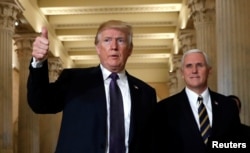After meeting with U.S. President Donald Trump, Republican senators Monday confirmed their intention to vote on a massive tax plan later this week that would permanently cut corporate taxes, temporarily cut income taxes, and add more than $1 trillion to America's national debt.
"The current plan this week is to vote on the Senate tax bill," said Majority Whip John Cornyn of Texas. "The goal is to get the economy growing again."
Cornyn and other Republicans on the Senate Finance Committee had a working lunch with Trump at the White House amid furious efforts to round up at least 50 votes for the tax plan in the 100-member chamber. Republicans have a two-seat majority, and no Senate Democrat has come out in favor of the bill. In the event of a 50-50 tie, Vice President Mike Pence would cast the deciding vote to pass the bill.
"We intend to get to 50 [votes]," said Finance Committee Chairman Orrin Hatch of Utah.
One Republican senator, Ron Johnson of Wisconsin, has declared he opposes the tax plan in its current form. News reports quote aides to another, Steve Daines of Montana, as saying the legislation is weighted too heavily in favor of large corporations. Several other Republican senators have expressed grave concerns about adding to the national debt, but have not said how they will vote.
Trump himself seemed to acknowledge a need to fine-tune the tax plan, tweeting that "middle class and job producers" would benefit from "just a few changes, some mathematical."
The House of Representatives approved a different version of tax reform earlier this month. Should the Senate bill pass, the two versions would have to be reconciled into a unified bill and win passage in both chambers before the president could sign it into law.
Democrats, meanwhile, are working furiously to oppose the tax initiative.
"Republicans are trying to jam through a tax plan that would raise taxes on millions of middle-class Americans," tweeted Virginia Senator Tim Kaine. "Call your Senators and tell them you oppose this bill."
Democrat Ron Wyden noted that the Senate version of the tax plan would eliminate a key Obamacare provision requiring Americans to purchase health care insurance or pay a penalty.
"The #GOPTaxPlan is not just an awful tax plan — it's an ATTACK on your health care," the Oregon senator tweeted. "It's time we make our voices heard and STOP this bill."
On Sunday, the non-partisan Congressional Budget Office concluded in a new report that the Senate bill would substantially benefit those earning more than $100,000 a year, while disadvantaging the country's poorest taxpayers.
VOA's Ken Bredemeier contributed to this report.





